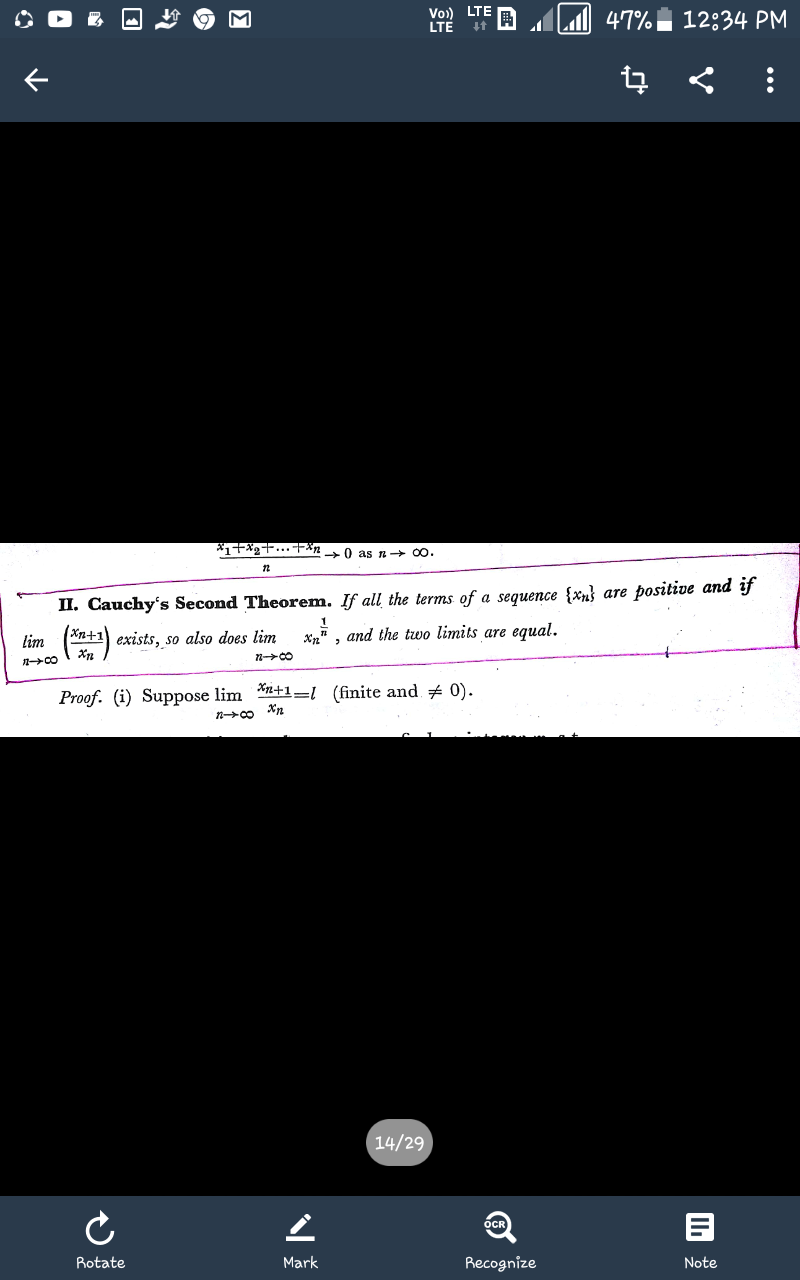
Question Number 34092 by rahul 19 last updated on 30/Apr/18
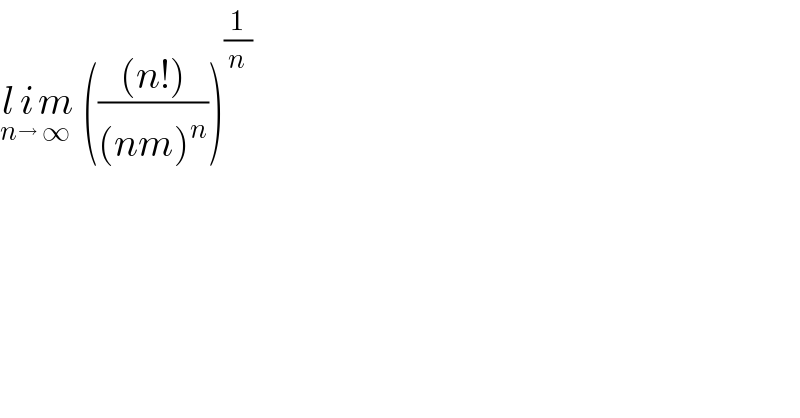
$$\underset{{n}} {{l}}\underset{} {{i}}\underset{\infty} {{m}}\:\left(\frac{\left({n}!\right)}{\left({nm}\right)^{{n}} }\right)^{\frac{\mathrm{1}}{{n}}} \\ $$
Commented by MJS last updated on 30/Apr/18
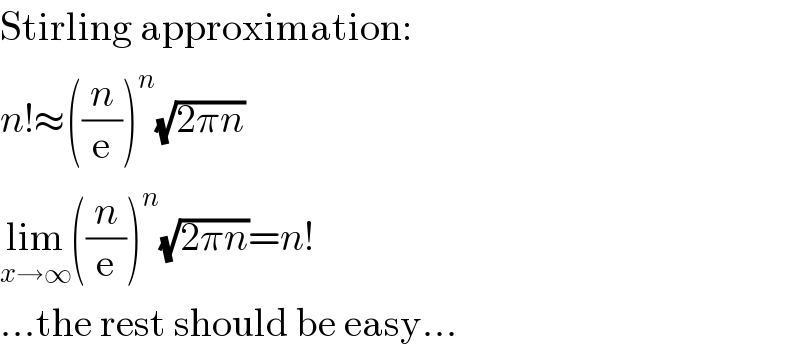
$$\mathrm{Stirling}\:\mathrm{approximation}: \\ $$$${n}!\approx\left(\frac{{n}}{\mathrm{e}}\right)^{{n}} \sqrt{\mathrm{2}\pi{n}} \\ $$$$\underset{{x}\rightarrow\infty} {\mathrm{lim}}\left(\frac{{n}}{\mathrm{e}}\right)^{{n}} \sqrt{\mathrm{2}\pi{n}}={n}! \\ $$$$...\mathrm{the}\:\mathrm{rest}\:\mathrm{should}\:\mathrm{be}\:\mathrm{easy}... \\ $$
Commented by rahul 19 last updated on 30/Apr/18

$${pls}\:{do}\:\:{this}\:{by}\:'{stirling}\:{approximation}' \\ $$$${and}\:{also}\:{do}\:{explain}\:{what}'{s}\:{that}\:. \\ $$
Commented by tanmay.chaudhury50@gmail.com last updated on 01/May/18

$${there}\:{is}\:{a}\:{method}\:{to}\:{solve}\:{this}\:{type}\:{of}\:{problem} \\ $$$${let}\:{me}\:{share}\:{theorem}\:{first}\:{along}\:{with}\:{some} \\ $$$${problem}\:{then}\:{i}\:{shall}\:{solve}\:{it} \\ $$
Commented by tanmay.chaudhury50@gmail.com last updated on 01/May/18
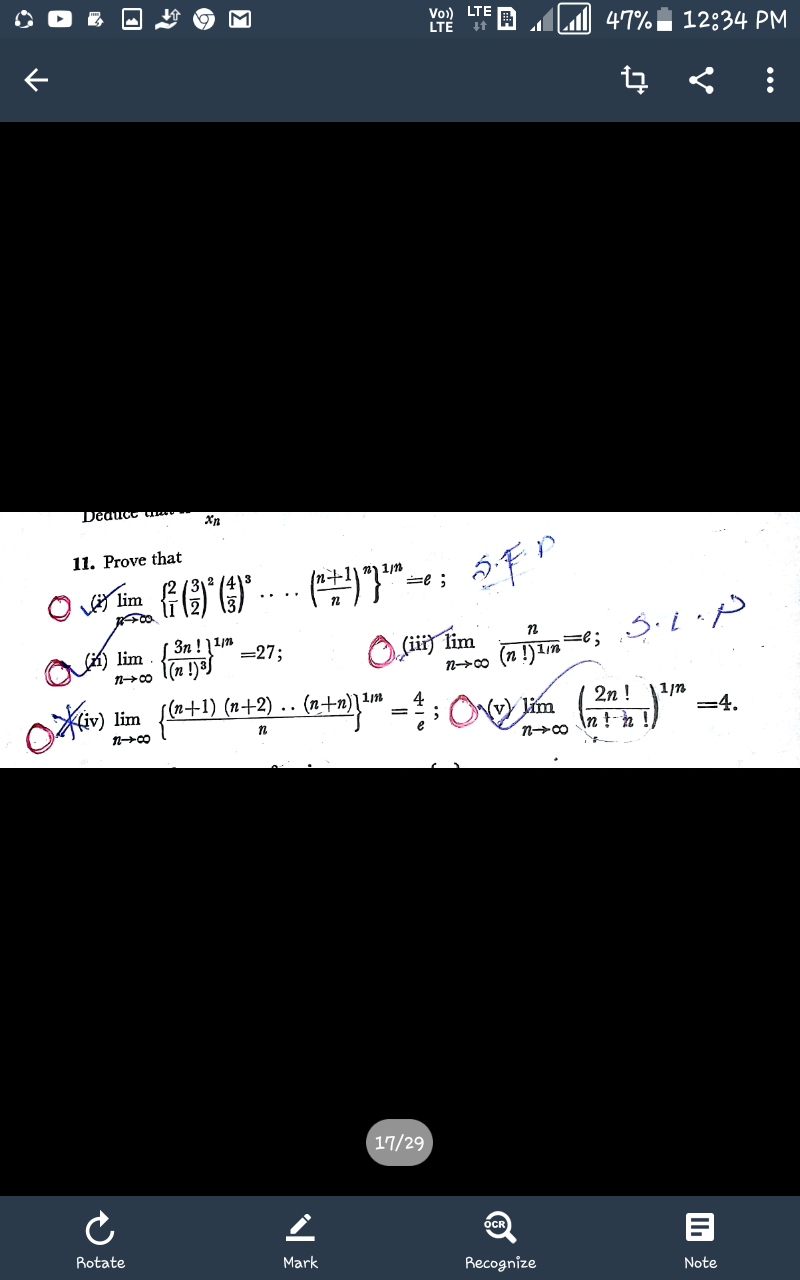
Commented by tanmay.chaudhury50@gmail.com last updated on 01/May/18
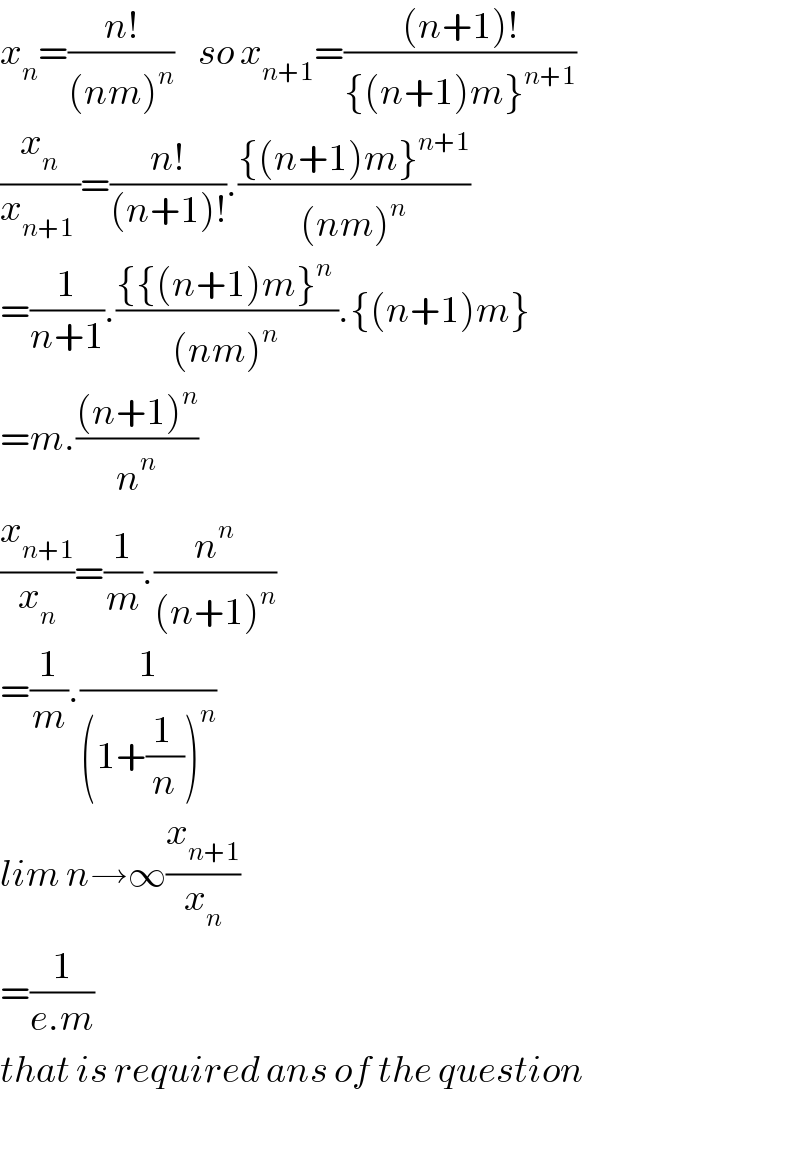
$${x}_{{n}} =\frac{{n}!}{\left({nm}\right)^{{n}} }\:\:\:\:{so}\:{x}_{{n}+\mathrm{1}} =\frac{\left({n}+\mathrm{1}\right)!}{\left\{\left({n}+\mathrm{1}\right){m}\right\}^{{n}+\mathrm{1}} } \\ $$$$\frac{{x}_{{n}} }{{x}_{{n}+\mathrm{1}} \:}=\frac{{n}!}{\left({n}+\mathrm{1}\right)!}.\frac{\left\{\left({n}+\mathrm{1}\right){m}\right\}^{{n}+\mathrm{1}} }{\left({nm}\right)^{{n}} } \\ $$$$=\frac{\mathrm{1}}{{n}+\mathrm{1}}.\frac{\left\{\left\{\left({n}+\mathrm{1}\right){m}\right\}^{{n}} \:\right.}{\left({nm}\right)^{{n}\:} }.\left\{\left({n}+\mathrm{1}\right){m}\right\} \\ $$$$={m}.\frac{\left({n}+\mathrm{1}\right)^{{n}} }{{n}^{{n}} } \\ $$$$\frac{{x}_{{n}+\mathrm{1}} }{{x}_{{n}} }=\frac{\mathrm{1}}{{m}}.\frac{{n}^{{n}} }{\left({n}+\mathrm{1}\right)^{{n}} } \\ $$$$=\frac{\mathrm{1}}{{m}}.\frac{\mathrm{1}}{\left(\mathrm{1}+\frac{\mathrm{1}\:}{{n}}\right)^{{n}} } \\ $$$${lim}\:{n}\rightarrow\infty\frac{{x}_{{n}+\mathrm{1}} }{{x}_{{n}} } \\ $$$$=\frac{\mathrm{1}}{{e}.{m}} \\ $$$${that}\:{is}\:{required}\:{ans}\:{of}\:{the}\:{question} \\ $$$$ \\ $$
Commented by rahul 19 last updated on 01/May/18

$$\mathscr{T}{hank}\:{you}\:{sir}. \\ $$$${well},\:{i}\:{think}\:{stirling}\:{aprroximation} \\ $$$${is}\:{better}\:\left({as}\:{it}\:{is}\:{short}\right)\:.\:{Anyways}, \\ $$$${it}'{s}\:{also}\:{a}\:{nice}\:{method}. \\ $$
Commented by rahul 19 last updated on 01/May/18
pls do post the solutions of the given 5 Ques. also by this theorem.
Commented by math khazana by abdo last updated on 02/May/18
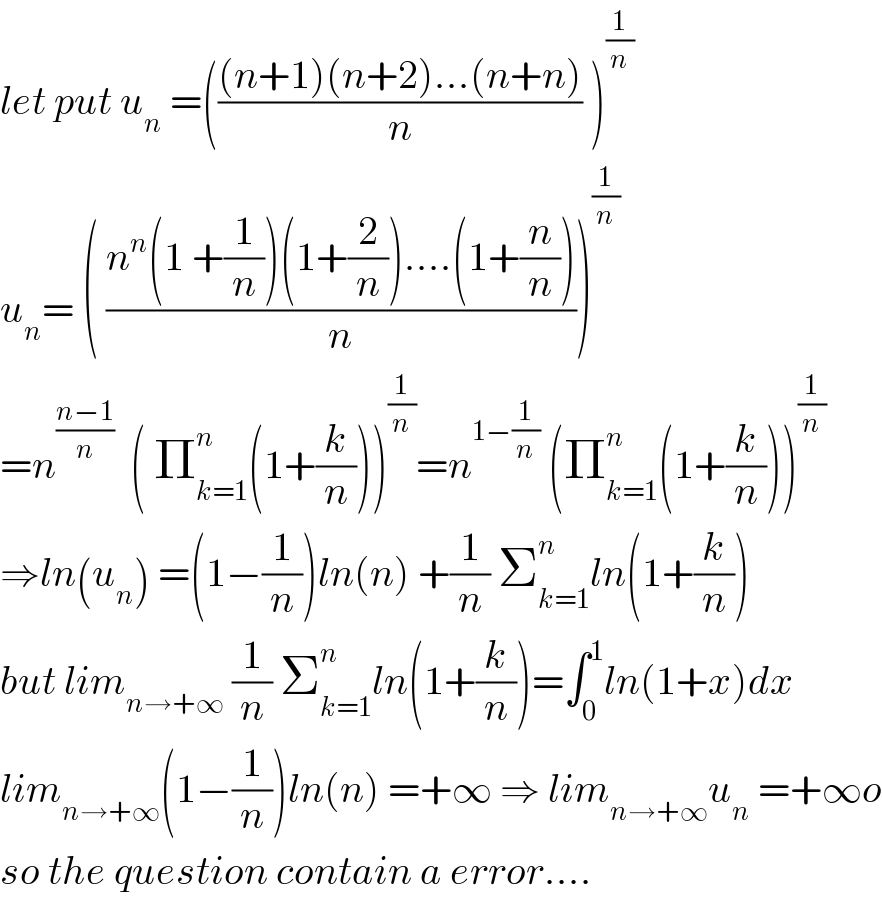
$${let}\:{put}\:{u}_{{n}} \:=\left(\frac{\left({n}+\mathrm{1}\right)\left({n}+\mathrm{2}\right)...\left({n}+{n}\right)}{{n}}\:\right)^{\frac{\mathrm{1}}{{n}}} \\ $$$${u}_{{n}} =\:\left(\:\frac{{n}^{{n}} \left(\mathrm{1}\:+\frac{\mathrm{1}}{{n}}\right)\left(\mathrm{1}+\frac{\mathrm{2}}{{n}}\right)....\left(\mathrm{1}+\frac{{n}}{{n}}\right)}{{n}}\right)^{\frac{\mathrm{1}}{{n}}} \\ $$$$={n}^{\frac{{n}−\mathrm{1}}{{n}}} \:\:\left(\:\prod_{{k}=\mathrm{1}} ^{{n}} \left(\mathrm{1}+\frac{{k}}{{n}}\right)\right)^{\frac{\mathrm{1}}{{n}}} ={n}^{\mathrm{1}−\frac{\mathrm{1}}{{n}}} \:\left(\prod_{{k}=\mathrm{1}} ^{{n}} \left(\mathrm{1}+\frac{{k}}{{n}}\right)\right)^{\frac{\mathrm{1}}{{n}}} \\ $$$$\Rightarrow{ln}\left({u}_{{n}} \right)\:=\left(\mathrm{1}−\frac{\mathrm{1}}{{n}}\right){ln}\left({n}\right)\:+\frac{\mathrm{1}}{{n}}\:\sum_{{k}=\mathrm{1}} ^{{n}} {ln}\left(\mathrm{1}+\frac{{k}}{{n}}\right) \\ $$$${but}\:{lim}_{{n}\rightarrow+\infty} \:\frac{\mathrm{1}}{{n}}\:\sum_{{k}=\mathrm{1}} ^{{n}} {ln}\left(\mathrm{1}+\frac{{k}}{{n}}\right)=\int_{\mathrm{0}} ^{\mathrm{1}} {ln}\left(\mathrm{1}+{x}\right){dx} \\ $$$${lim}_{{n}\rightarrow+\infty} \left(\mathrm{1}−\frac{\mathrm{1}}{{n}}\right){ln}\left({n}\right)\:=+\infty\:\Rightarrow\:{lim}_{{n}\rightarrow+\infty} {u}_{{n}} \:=+\infty{o} \\ $$$${so}\:{the}\:{question}\:{contain}\:{a}\:{error}.... \\ $$
Commented by tanmay.chaudhury50@gmail.com last updated on 03/May/18

Answered by MJS last updated on 30/Apr/18
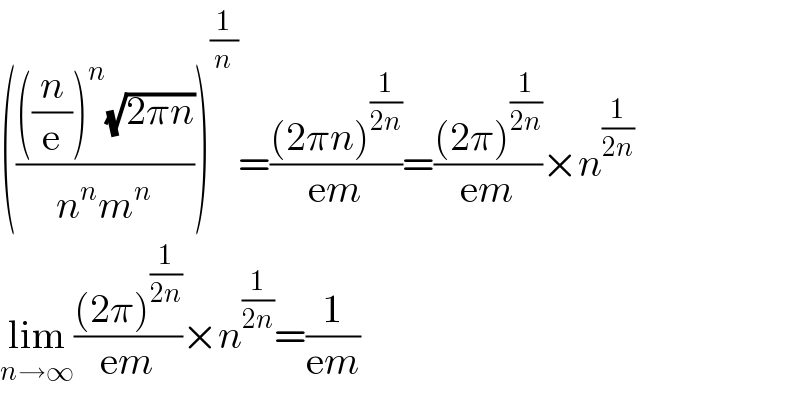
$$\left(\frac{\left(\frac{{n}}{\mathrm{e}}\right)^{{n}} \sqrt{\mathrm{2}\pi{n}}}{{n}^{{n}} {m}^{{n}} }\right)^{\frac{\mathrm{1}}{{n}}} =\frac{\left(\mathrm{2}\pi{n}\right)^{\frac{\mathrm{1}}{\mathrm{2}{n}}} }{\mathrm{e}{m}}=\frac{\left(\mathrm{2}\pi\right)^{\frac{\mathrm{1}}{\mathrm{2}{n}}} }{\mathrm{e}{m}}×{n}^{\frac{\mathrm{1}}{\mathrm{2}{n}}} \\ $$$$\underset{{n}\rightarrow\infty} {\mathrm{lim}}\frac{\left(\mathrm{2}\pi\right)^{\frac{\mathrm{1}}{\mathrm{2}{n}}} }{\mathrm{e}{m}}×{n}^{\frac{\mathrm{1}}{\mathrm{2}{n}}} =\frac{\mathrm{1}}{\mathrm{e}{m}} \\ $$
Commented by rahul 19 last updated on 30/Apr/18

$${my}\:{doubt}\:{is}\::\: \\ $$$${how}\:\underset{{n}} {\mathrm{l}}\underset{} {\mathrm{i}}\underset{\infty} {\mathrm{m}}\:{n}^{\frac{\mathrm{1}}{\mathrm{2}{n}}} \:=\:\mathrm{1}\:? \\ $$
Commented by MJS last updated on 30/Apr/18
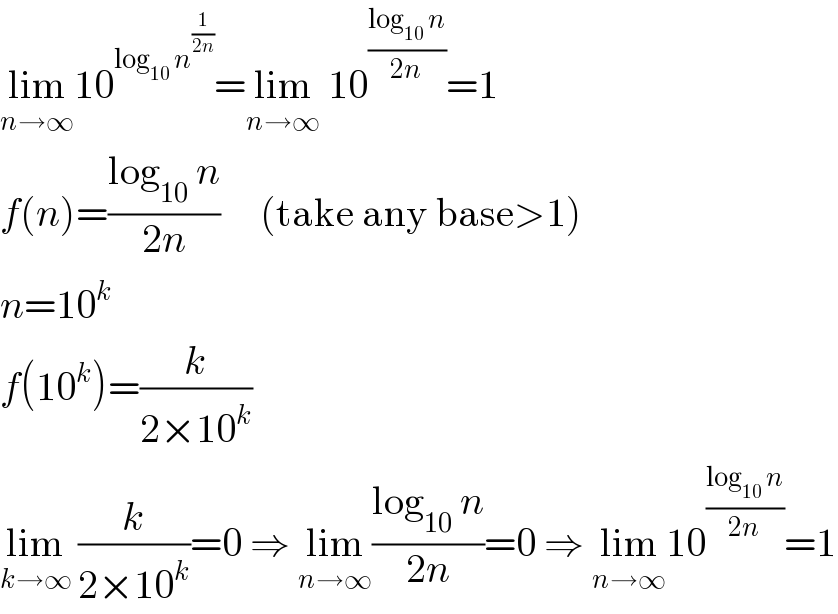
$$\underset{{n}\rightarrow\infty} {\mathrm{lim}10}^{\mathrm{log}_{\mathrm{10}} \:{n}^{\frac{\mathrm{1}}{\mathrm{2}{n}}} } =\underset{{n}\rightarrow\infty} {\mathrm{lim}}\:\mathrm{10}^{\frac{\mathrm{log}_{\mathrm{10}} \:{n}}{\mathrm{2}{n}}} =\mathrm{1} \\ $$$${f}\left({n}\right)=\frac{\mathrm{log}_{\mathrm{10}} \:{n}}{\mathrm{2}{n}}\:\:\:\:\:\left(\mathrm{take}\:\mathrm{any}\:\mathrm{base}>\mathrm{1}\right) \\ $$$${n}=\mathrm{10}^{{k}} \\ $$$${f}\left(\mathrm{10}^{{k}} \right)=\frac{{k}}{\mathrm{2}×\mathrm{10}^{{k}} } \\ $$$$\underset{{k}\rightarrow\infty} {\mathrm{lim}}\:\frac{{k}}{\mathrm{2}×\mathrm{10}^{{k}} }=\mathrm{0}\:\Rightarrow\:\underset{{n}\rightarrow\infty} {\mathrm{lim}}\frac{\mathrm{log}_{\mathrm{10}} \:{n}}{\mathrm{2}{n}}=\mathrm{0}\:\Rightarrow\:\underset{{n}\rightarrow\infty} {\mathrm{lim}10}^{\frac{\mathrm{log}_{\mathrm{10}} \:{n}}{\mathrm{2}{n}}} =\mathrm{1} \\ $$
Commented by rahul 19 last updated on 30/Apr/18

$$\mathscr{T}\mathrm{hank}\:\mathrm{you}\:\mathrm{sir}\:! \\ $$
Commented by prof Abdo imad last updated on 30/Apr/18

$${n}^{\frac{\mathrm{1}}{\mathrm{2}{n}}} =\:{e}^{\frac{\mathrm{1}}{\mathrm{2}{n}}{ln}\left({n}\right)} \:\:{and}\:{we}\:{know}\:{that}\:{lim}_{{n}\rightarrow+\infty} \frac{{ln}\left({n}\right)}{{n}}=\mathrm{0} \\ $$$$\Rightarrow\:{lim}_{{n}\rightarrow+\infty} {n}^{\frac{\mathrm{1}}{\mathrm{2}{n}}} \:\:={e}^{\mathrm{0}} \:=\mathrm{1}\:. \\ $$
Commented by rahul 19 last updated on 01/May/18

$$\mathscr{T}\mathrm{hank}\:\mathrm{you}\:\mathrm{sir}! \\ $$
Answered by tanmay.chaudhury50@gmail.com last updated on 01/May/18
